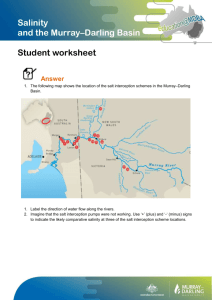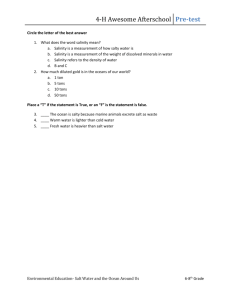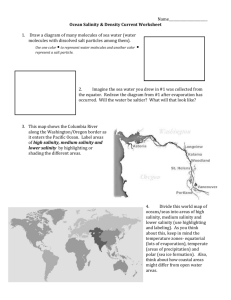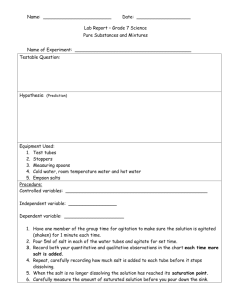Pyramid Creek Salt Interception Scheme - Murray
advertisement
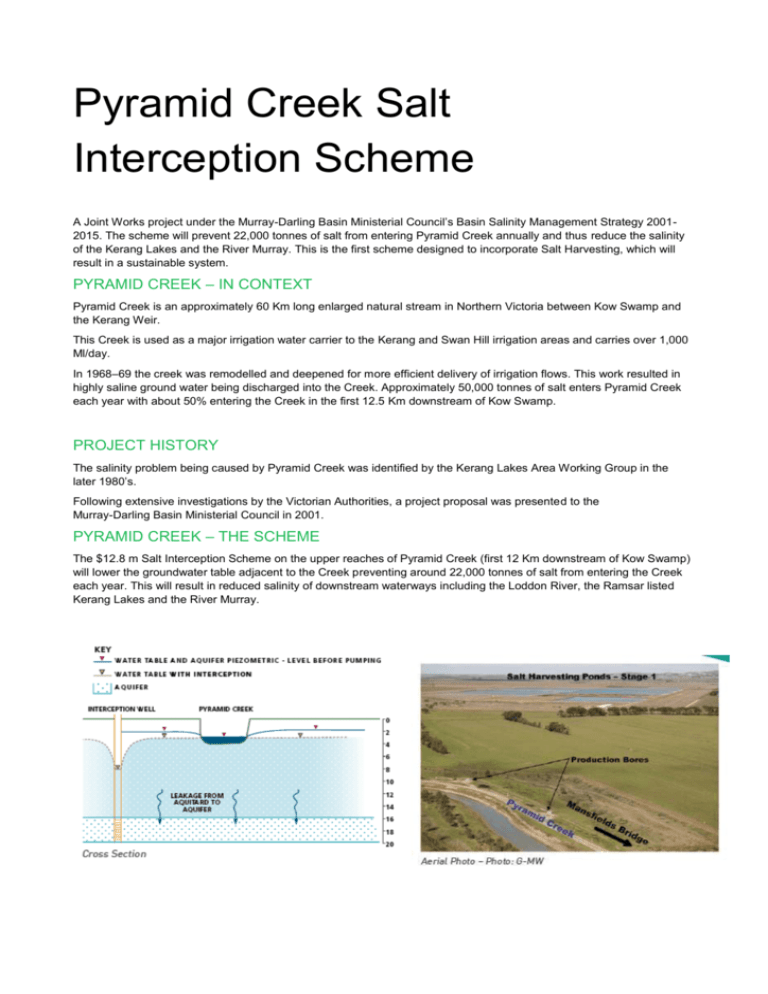
Pyramid Creek Salt Interception Scheme A Joint Works project under the Murray-Darling Basin Ministerial Council’s Basin Salinity Management Strategy 20012015. The scheme will prevent 22,000 tonnes of salt from entering Pyramid Creek annually and thus reduce the salinity of the Kerang Lakes and the River Murray. This is the first scheme designed to incorporate Salt Harvesting, which will result in a sustainable system. PYRAMID CREEK – IN CONTEXT Pyramid Creek is an approximately 60 Km long enlarged natural stream in Northern Victoria between Kow Swamp and the Kerang Weir. This Creek is used as a major irrigation water carrier to the Kerang and Swan Hill irrigation areas and carries over 1,000 Ml/day. In 1968–69 the creek was remodelled and deepened for more efficient delivery of irrigation flows. This work resulted in highly saline ground water being discharged into the Creek. Approximately 50,000 tonnes of salt enters Pyramid Creek each year with about 50% entering the Creek in the first 12.5 Km downstream of Kow Swamp. PROJECT HISTORY The salinity problem being caused by Pyramid Creek was identified by the Kerang Lakes Area Working Group in the later 1980’s. Following extensive investigations by the Victorian Authorities, a project proposal was presented to the Murray-Darling Basin Ministerial Council in 2001. PYRAMID CREEK – THE SCHEME The $12.8 m Salt Interception Scheme on the upper reaches of Pyramid Creek (first 12 Km downstream of Kow Swamp) will lower the groundwater table adjacent to the Creek preventing around 22,000 tonnes of salt from entering the Creek each year. This will result in reduced salinity of downstream waterways including the Loddon River, the Ramsar listed Kerang Lakes and the River Murray. SCHEME OPERATION Goulburn-Murray Water operates and maintains the interception scheme Pyramid Salt Pty Ltd operates and maintains a harvesting facility Goulburn-Murray Water monitors and manages the impact of the interception scheme Goulburn-Murray Water monitors the impact and performance of the salt harvesting pondage INTERCEPTION WORKS The salt interception works comprises 113 production bores along a 12 Km stretch of Pyramid Creek, each of which is equipped with an electrical submersible pump. An extensive network of monitoring bores is used to monitor the performance of the production bores and the salt harvesting pondage. A 3 Km transfer pipeline is used to deliver saline groundwater from the production bores to the salt harvesting ponds. Groundwater salinity along this section of Pyramid Creek is around 44,000 EC Units (an EC unit is a measure of salinity concentration with seawater around 50,000 EC Units). SALT HARVESTING OPERATION The salt harvesting operation consists of 240 Ha of ponds located on a 400 Ha site. All ponds are lined with polyethylene to minimise leakage for the ponds back to the groundwater. There is a buffer zone around the perimeter of these ponds that have been revegetated. Pyramid Salt Pty Ltd is expecting to harvest upwards of 36,000 tonnes of salt annually from this site that will be used in the production of a range of salt products that include premium and specialty table salt products, swimming pool salt, and other industrial salt products. THE BASIN SALINITY MANAGEMENT STRATEGY 2001–2015 The Basin Salinity Management Strategy 2001–2015 is the Murray-Darling Basin Ministerial Council’s response to the threats of salinity to water quality, environmental values, regional infrastructure and productive agricultural land. The strategy sets out how Basin Communities and Governments will work together to control salinity and protect important assets and environmental values. A key element of the Basin Salinity Management Strategy was the implementation of a joint works program to offset a predicted 61EC future increase in average salinity at Morgan. Since the Strategy came into effect, the partner governments of New South Wales, Victoria, South Australia and the Australian government have, initially through the Murray-Darling Basin Commission and more recently the Murray-Darling Basin Authority, invested in the construction, operation and maintenance of Salt Interception and Drainage Disposal Schemes to meet the salinity targets of the BSMS, therefore protecting the River Murray from the impact of rising salinity. SALT AS A RESOURCE Although Salt as a Resource opportunities are limited, it has been recognised by the Partner Governments of the Murray-Darling Basin Authority that to ensure sustainability of operation of salt interception commercial use of saline water may be appropriate. This could include saltland agronomy, timber production and salt harvesting and processing. Other uses of saline water include saline aquaculture and energy production. Further Information Murray-Darling Basin Authority Telephone (02) 6279 0100 International + 61 2 6279 0100 Postal Address GPO Box 1801, Canberra ACT 2601 For more information on Salinity or Salt Interception Schemes, visit the Murray-Darling Basin Authority website: www.mdba.gov.au Goulburn-Murray Water Telephone: (03) 5451 0111 Pyramid Salt Pty Ltd Telephone: (03) 5455 1299 Fax: (03) 5455 1330 Email: contact@pyramidsalt.com.au Funded by the Victorian, South Australian, New South Wales and Australian Governments through the Murray-Darling Basin Authority. Salt harvested by: Managed by:
